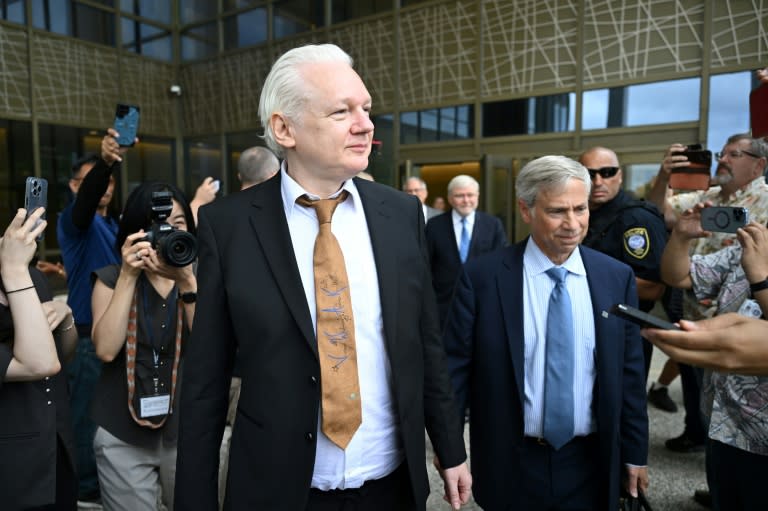WikiLeaks founder Assange returns home a free man

WikiLeaks founder Julian Assange returned home to Australia to start life as a free man Wednesday after admitting he revealed US defence secrets in a deal that unlocked the door to his London prison cell.
Assange landed on a chilly Canberra evening in a private jet, the final act of an international drama that led him from a five-year stretch in the high-security Belmarsh prison in Britain to a courtroom in a US Pacific island territory and, finally, home.
His white hair swept back, the Australian raised a fist as he emerged from the plane door, striding across the tarmac to give a hug to his wife Stella that lifted her off the ground, and then to embrace his father.
Dozens of television journalists, photographers and reporters peered through the airport fencing to see Assange, who wore a dark suit, white shirt and brown tie.
WikiLeaks said on X that it would hold a press conference in the Australian capital at 9:15 pm (1115 GMT) on Wednesday, but did not say if Assange would be present.
"He will be able to spend quality time with his wife Stella, and his two children, be able to walk up and down on the beach and feel the sand through his toes in winter -- that lovely chill," said Assange's father, John Shipton.
Assange's long battle with US prosecutors came to an unexpected end in the Northern Mariana Islands where a judge accepted his guilty plea on a single count of conspiracy to obtain and disseminate national defence information.
The remote courtroom was chosen because of the 52-year-old's unwillingness to go to the continental United States and because of its proximity to Australia.
- 'A free man' -
As part of a behind-the-scenes legal negotiation with the US Justice Department he was sentenced to the time he had already served in London -- five years and two months -- and given his liberty.
"You will be able to walk out of this courtroom a free man," the judge told him.
Assange had published hundreds of thousands of confidential US documents on the whistleblowing website from 2010.
He became a hero to free speech campaigners but a villain to those who thought he endangered US security and intelligence sources.
"Working as a journalist, I encouraged my source to provide material that was said to be classified," Assange told the court.
Assange's lawyer Jen Robinson told reporters it was a "historic day" that "brings to an end 14 years of legal battles".
"It also brings to an end a case which has been recognised as the greatest threat to the First Amendment in the 21st century," she said.
- 'Too long' -
Australian Prime Minster Anthony Albanese said he was "very pleased" by the outcome.
"Regardless of your views about his activities, and they will be varied, Mr Assange's case has dragged on for too long," he told parliament in Canberra.
The United Nations also hailed Assange's release, saying the case had raised human rights concerns.
But former US vice president Mike Pence slammed the plea deal on social media platform X as a "miscarriage of justice" that "dishonors the service and sacrifice of the men and women of our Armed Forces."
The US justice department said after the hearing that Assange was banned from returning there without permission.
US authorities had wanted to put Assange on trial for divulging military secrets about the wars in Iraq and Afghanistan.
He was indicted by a US federal grand jury in 2019 on 18 counts stemming from WikiLeaks' publication of a trove of national security documents.
The material he released through WikiLeaks included video showing civilians being killed by fire from a US helicopter gunship in Iraq in 2007. The victims included a photographer and a driver from Reuters.
- 'Can't stop crying' -
In 2019 he was arrested and held in Belmarsh prison while fighting extradition to the United States.
He had spent seven years in Ecuador's embassy in London to avoid being extradited to Sweden, where he faced accusations of sexual assault that were eventually dropped.
He met his wife Stella Assange while holed up in the embassy, and the pair married in a ceremony in London's Belmarsh prison. They have two young children.
"I can't stop crying," Stella, who was waiting for him in Australia, said on X.
"I am beyond excited," she later told reporters as she left a Canberra hotel together with Assange's father to see her husband at the airport.
The announcement of the plea deal came two weeks before Assange was scheduled to appear in court in Britain to appeal against a ruling that approved his extradition to the United States.
Washington had accused Assange under the 1917 Espionage Act and supporters warned he risked being sentenced to 175 years in prison.
The plea deal was not entirely unexpected. US President Joe Biden had been under growing pressure to drop the long-running case against Assange.
The Australian government made an official request to that effect in February and Biden said he would consider it, raising hopes among Assange supporters that his ordeal might end.
burs-djw/ser


